|
|
|
Sort Order |
|
|
|
Items / Page
|
|
|
|
|
|
|
| Srl | Item |
| 1 |
ID:
154842
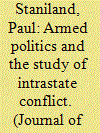

|
|
|
|
|
| Summary/Abstract |
Though the two are often conflated, violence is not identical to conflict. This article makes the case for studying state-armed group interactions across space, time, and levels of violence as part of an ‘armed politics’ approach to conflict. It conceptualizes and measures armed orders of alliance, limited cooperation, and military hostilities, and the termination of these orders in collapse or incorporation. The article applies this framework to four contexts in South Asia. It measures armed orders across five groups and six decades in Nagaland in India, and then offers a briefer overview of state-group armed orders in Karachi in Pakistan, Mizoram in India, and Wa areas of northern Burma/Myanmar. Examining armed politics improves our understanding of ceasefires and peace deals, rebel governance, and group emergence and collapse, among other important topics. This approach complements existing data on civil conflict while identifying a new empirical research agenda and policy implications.
|
|
|
|
|
|
|
|
|
|
|
|
|
|
|
|
| 2 |
ID:
154847


|
|
|
|
|
| Summary/Abstract |
This article studies whether the pursuit of counterterrorism militarizes foreign aid flows. It focuses on the case of US foreign aid to sub-Saharan African states, which recently have experienced an increase in the presence of al-Qaeda or its affiliate terrorist organizations. This article argues that as terrorist groups carry out attacks inside a state’s territory, aid towards that state will serve such counterterrorism goals. For one, the state’s executive branch will receive increased military aid to immediately fight al-Qaeda or affiliates. For the other, the United States also steps up aid for civil society and development, which could over time undermine al-Qaeda’s mobilization and recruitment efforts. In an empirical analysis that covers 46 African states from 1996 to 2011, our results largely corroborate the hypothesized patterns for attacks that occur on a country territory and in the neighborhood. We note, though, that the overall composition of aid shifts relative to the military when there are direct attacks, something that does not occur when attacks happen in the neighborhood only. Our article concludes that concerns about militarization of aid are warranted, but that actual manifestations are nuanced.
|
|
|
|
|
|
|
|
|
|
|
|
|
|
|
|
| 3 |
ID:
154844
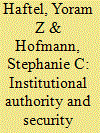

|
|
|
|
|
| Summary/Abstract |
The proliferation of regional economic organizations (REOs) is a prominent feature of the contemporary international environment. Many of these organizations aspire to promote regional peace and stability. Some strive to promote these goals only through economic cooperation, while others have expanded their mandate to include mechanisms that address security concerns more directly. A glance at the security components of such organizations indicates that their purpose and design are very diverse. This article sheds light on the sources of this poorly understood phenomenon. Specifically, it argues that organizations that enjoy greater delegated authority are in a better position to expand their mandate into the security realm and to have more far-reaching agreements in this issue area. It then develops a metric that gauges the degree of security cooperation within REOs and presents a new dataset of numerous organizations on this institutional aspect. Employing this dataset in a rigorous statistical analysis and controlling for a host of alternative explanations, it demonstrates that, indeed, REOs with greater delegated authority develop deeper security cooperation.
|
|
|
|
|
|
|
|
|
|
|
|
|
|
|
|
| 4 |
ID:
154845
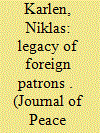

|
|
|
|
|
| Summary/Abstract |
Why do some armed conflicts that have ended experience renewed fighting while others do not? Previous research on conflict recurrence has approached this question by looking at domestic factors such as how the war was fought, how it ended or factors associated with its aftermath. With the exception of the literature on third-party security guarantees, the influence of outside actors has often been overlooked. This article explores the role of external states and suggests when and how their involvement is likely to affect the probability of renewed warfare. The main argument is that the legacy of outside support creates an external support structure that affects the previous combatants’ willingness as well as their opportunities to remobilize. This means that armed conflicts with external state support will experience a greater likelihood of recurrence compared to other conflicts which did not see external support. The theory is tested using Cox proportional hazards models on global data of intrastate armed conflicts 1975–2009. The findings suggest that external support to rebels increases the risk of conflict recurrence in the short term as groups receive or anticipate renewed assistance. The results also indicate that it is more important for rebel groups to have had enduring support over the years in the previous conflict rather than access to multiple state sponsors. External support provided to governments is not associated with conflict recurrence.
|
|
|
|
|
|
|
|
|
|
|
|
|
|
|
|
| 5 |
ID:
154846


|
|
|
|
|
| Summary/Abstract |
The literature on civil war onset focuses on the effect of oil on domestic actors but relatively little suggests its effect on external actors who can intervene in an oil-producing state, although most revenues of oil-producing states are generated by their oil export to other states. This article advances a theory of oil export, external prewar support for the government, and civil war onset. In the international oil market, although oil is a primary energy source in most states, there are few oil exporters. This implies that costs of breaking an oil trade tie are greater for an oil-importing state vis-à-vis an oil-exporting state and, thus, oil-importing states are likely to have concerns about oil-exporting states’ political instability that can cause civil conflict onset and break their oil trade ties. I hypothesize that a state’s oil export increases the likelihood of external prewar support for its government. However, because oil-exporting states are likely to conceal the information about their oil export to prevent public grievances against the distribution of oil revenues and their governments’ incompetence in oil export, rebels are less likely to have complete information about oil export. The secrecy of oil export hinders finding a mutually acceptable bargaining range between the government and rebels, and increases the likelihood of civil conflict onset in oil-exporting states without external support for the government. I measure each state’s oil export using network analysis, and test these hypotheses using logit models. Empirical results support the hypotheses.
|
|
|
|
|
|
|
|
|
|
|
|
|
|
|
|
| 6 |
ID:
154850
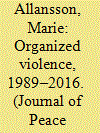

|
|
|
|
|
| Summary/Abstract |
The dramatic increase in the number of fatalities in organized violence, seen between 2011 and 2014, did not continue in 2015 and 2016. Rather, the notation of some 131,000 fatalities in 2014 was followed by a steep decline, with just below 119,000 in 2015 and a little over 102,000 fatalities in 2016. Despite the decrease, the number was the fifth highest during the entire 1989–2016 period. Most of the fatalities – over 87,000 – were incurred in state-based conflicts, the main driver behind the trend. Just as the number of fatalities, the number of state-based conflicts, albeit remaining on a high level, continued to decrease in 2016, going from 52 to 49, with 12 of them reaching the level of war, with at least 1,000 battle-related deaths. Also the non-state conflicts dropped in number in 2016, from 73 to 60. This was followed by a decrease in the number of fatalities, and only one conflict caused more than 1,000 deaths. Twenty-one actors were registered in one-sided violence, down by five from 2015. A number this low has only been recorded twice before; in both 2009 and 2010, 21 one-sided actors were listed in UCDP data. The number of fatalities also decreased, going from almost 9,800 to a little over 6,000.
|
|
|
|
|
|
|
|
|
|
|
|
|
|
|
|
| 7 |
ID:
154849


|
|
|
|
|
| Summary/Abstract |
Previous literature has shown a link between violent victimization and pro-sociopolitical behavior. This study asks why victimization is shown to increase the likelihood of political participation in regions of ongoing armed conflict. I argue that previous answers to this question have overlooked a key variable for predicting civilian behavior: individual-level social context. As a step forward in connecting social networks to behavior outcomes, I present the kinship network as a novel measure for proxying an individual’s valuable and private social interactions. Building on previous victimization literature, I suggest that to comprehensively understand the effects of victimization, scholars should account for social context. Specifically, I examine the hypothesis that as kinship ties strengthen, victimization positively influences the likelihood of political participation. To test this argument, I turn to the Mexican criminal conflict. I use original survey data of 1,000 respondents collected in July 2012 from the ongoing drug war in Mexico, and in doing so, I find that kinship plays a key role in motivating political participation during armed conflicts in that survivors of criminal violence with strong ties to kinship networks are the most likely to participate in political groups; these results are robust to state-level fixed effects and are unlikely to be driven by victimization selection bias.
|
|
|
|
|
|
|
|
|
|
|
|
|
|
|
|
| 8 |
ID:
154848
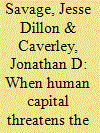

|
|
|
|
|
| Summary/Abstract |
How does aid in the form of training influence foreign militaries’ relationship to domestic politics? The United States has trained tens of thousands of officers in foreign militaries with the goals of increasing its security and instilling respect for human rights, democracy, and civilian control. We argue that training increases the military’s power relative to the regime in a way that other forms of military assistance do not. While other forms of military assistance are somewhat fungible, allowing the regime to shift resources towards coup-proofing, human capital is a resource vested solely in the military. Training thus alters the balance of power between the military and the regime resulting in greater coup propensity. Using data from 189 countries from 1970 to 2009 we show that greater numbers of military officers trained by the US International Military Education and Training (IMET) and Countering Terrorism Fellowship (CTFP) programs increases the probability of a military coup.
|
|
|
|
|
|
|
|
|
|
|
|
|
|
|
|
| 9 |
ID:
154843
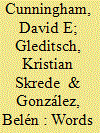

|
|
|
|
|
| Summary/Abstract |
Dissidents can choose among different tactics to redress political grievances, yet violent and nonviolent mobilization tend to be studied in isolation. We examine why some countries see the emergence of organized dissident activity over governmental claims, and why in some cases these organizational claims result in civil wars or nonviolent campaigns, while others see no large-scale collective action. We develop a two-stage theoretical framework examining the organized articulation of political grievance and then large-scale violent and nonviolent collective action. We test implications of this framework using new data on governmental incompatibilities in a random sample of 101 states from 1960 to 2012. We show that factors such as demography, economic development, and civil society have differential effects on these different stages and outcomes of mobilization. We demonstrate that the common finding that anocracies are more prone to civil war primarily stems from such regimes being more prone to see maximalist political demands that could lead to violent mobilization, depending on other factors conducive to creating focused military capacity. We find that non-democracy generally promotes nonviolent campaigns as anocracies and autocracies are both more likely to experience claims and more prone to nonviolent campaigns, conditional on claims.
|
|
|
|
|
|
|
|
|
|
|
|
|
|
|
|
|
|
|
|
|